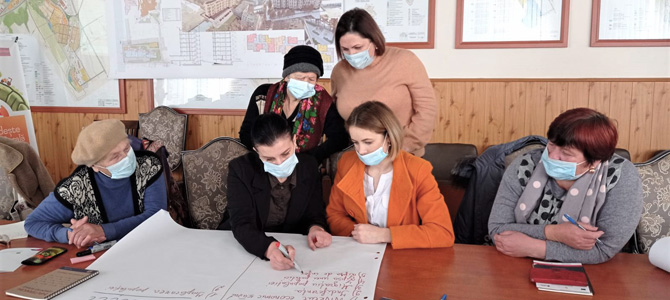Between September 2021 – January 2022, the Institute for Rural Initiatives (iRi) launched a public awareness campaign on the importance of updating the concept of rural development in the Republic of Moldova.
After a series of trainings and discussions at expert level, iRi together with the 10 partner NGOs, organized discussions and events with various stakeholders from 10 districts of the country.
Within the events, the participants got acquainted with the realities of rural development in the Republic of Moldova and discussed the need to rethink the concept of rural development in the Republic of Moldova:
“The term of rural development refers to the change of perception of the citizens, namely to see rural communities not only as a place to grow cereals, but to look at the village from more perspectives, because each village has its picturesque places, local resources and beautiful stories, therefore, ‘let’s fight’ for our communities to come to life, but for that every citizen should get involved.” – Mariana Hanganu, representative of Riscani district council.
As a result of these discussions, over 160 local stakeholders (mayors, deputy mayors, fundraising specialists, school principals, House of Culture directors, librarians, farmers, entrepreneurs, district and local councilors, NGO representatives, etc.) agreed on the need to put the Moldovan village and the villagers at the center of rural development policies, but not only the agricultural product and the state program – as suggested by the latest studies conducted by the Institute for Rural Initiatives (iRi).
The participants in the district activities also had a practical exercise where they identified the main challenges / obstacles in rural development in their region and came up with proposals for national decision makers. Among the most frequently mentioned challenges were: migration of people from villages to cities or abroad, limited budgetary resources to counteract this phenomenon and related effects, low level of information to citizens about existing opportunities, frequent change of governments/local leaders, etc. In light of these challenges, the participants came up with ideas for solutions:
“Organizing qualification and training programs based on rural development policies would educate the population in this sector.” – Aliona Cojocaru, mayor of Gura Cainarului, district of Floresti.
“Mobilizing the community members and cooperating more active with the Diaspora would contribute to the development of our villages.” – Tatiana Carp, school principal, Lucesti village, district of Cahul.
“It is essential to encourage entrepreneurship and create small and medium-sized enterprises in rural areas that could contribute to the diversification of economic activities and prevent the departure of the young generation from the villages.” – Ana Antonciuc, representative of the NGO “Alianta intre generatii”, Falesti town.
Also, during these regional events, there were discussed the lacks of the traditional model of rural development versus the modern model developed by iRi. The experts-contributors argued that the modern model could be adapted using various tools such as: tested solutions and other countries’ experiences with rural-specific public policies, the intentional approach of rural development policy in which the villager should be at the center of policy and mechanisms of intervention, attracting investments in specific rural projects in which the final beneficiaries are people from rural areas, including the rural development desideratum as a horizontal priority of all development projects in the country, increasing the collaboration between LPA and local NGOs, inter-community cooperation, programs with targeted destination, etc.
The stakeholders mentioned the importance and usefulness of organizing such events considering the lack of discussion platforms that address critically and multi-dimensional issues of rural development.
The second round of such district-level events is scheduled for March-April 2022. At the same time, the Institute for Rural Initiatives (iRi) leads discussions with the key institution on public rural development policies – the Ministry of Agriculture and Food Industry of the Republic of Moldova and other relevant agencies to advance the topic to a higher stage of social dialogue in order to identify solutions in the interest of citizens from the rural areas of the Republic of Moldova.
iRi plans to organize a series of online exchanges of experience with representatives of rural development agencies from Italy, Romania and the United States.
The activity is part of the project “ReThink Rural Moldova”, implemented by the Institute for Rural Initiatives (iRi) and local partners with the support of the US Embassy in the Republic of Moldova.
